Description
Genus: Boletus
Species: sensibilis
Common Name: “Curry Bolete”
Tells: Yellow pores, yellow flesh, red-brown cap, & yellow stem (which may have pink/red by base) all blue instantly & profoundly. Distinctive odor.
Other Information: The stem occasionally has fine netting on top. Blue-stained pores can eventually fade to reddish brown. About the smell: The aroma is usually described as “curry” or “fenugreek” (a key spice in the curry mix), but aromas are notoriously personal, and it isn’t present 100% of the time. Others have called the smell “fruity,” “like maple,” and occasionally like “anise or licorice.” The point is this: B. sensibilis often presents with a powerful smell you can learn to recognize; and if you are new, as a clue about what to check on. We come equipped with a portable chemistry set. Use it!
Edibility: Good, but only recently promoted there. Bottom line: many reliable foragers are known to eat and enjoy this mushroom, and all recent reports on the Internet take that view. Nevertheless, older books unanimously listed it as a sick-maker and received lore deserves a certain amount of respect. We have promoted it from “avoid” through “iffy” to “edible” based on Boletes of Eastern North America and those online discussions, but nevertheless urge a bit of skepticism, thorough cooking, and some care to start with small portions.
CHEMICAL TESTS:
- NH4OH (Ammonia): Cap skin and flesh both turn yellow.
- KOH: Cap skin and flesh both turn yellow.
- FeSO4 (Iron Salts): Cap skin turns greenish-gray. Cap flesh turns yellow-orange to yellow-brown.
Links:
 |
567 |  |
316
319 |
 |
157 |  |
150 |

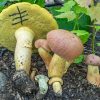
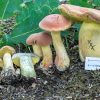
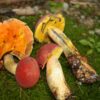
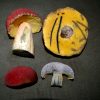

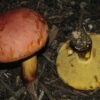
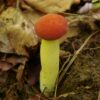
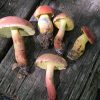
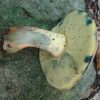
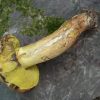
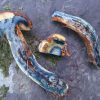
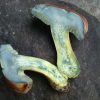
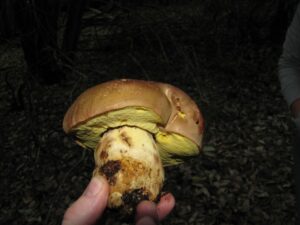
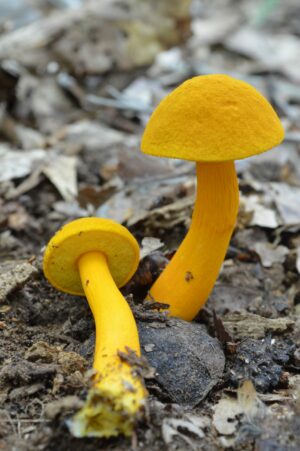
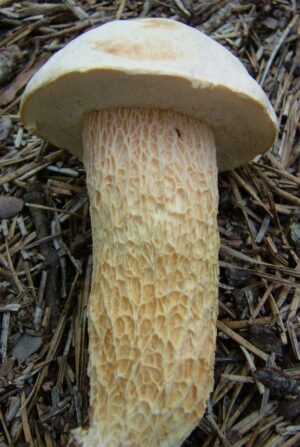
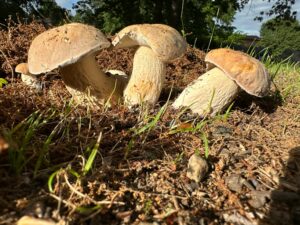
Got something to discuss?
One of the pictures here (by Debbie Viess) looks really like Baorangia bicolor. Very confusing. How do you really tell these two apart?
The amount and color of the blue bruising is a big clue, and so is a distinct curry odor, but the bottom line is that it’s hard. The group of red-and-yellow boletes may be the single hardest one to identify down to species.
I have a collection that doesn’t stain blue instantly, profoundly, or much at all. Before, or after I put them in the ‘fridge overnight. I do get what could be a curry odor.It’s a somewhat celery odor. Not mentioned in this description,but shown in the photos is the inrolled, waver edge on all but the most mature specimen I found. Is this diagnostic?
Sounds like you have a different species. Try posting it on Mushroom Observer, iNaturalist, or one of the applicable Facebook groups.
Found one of these in Northern Arizona at 7500′ near Flagstaff. Aug2021
Photo #5 (credited to NAMA) is currently being displayed on both the Boletus sensibilis page AND the Lanmaoa psuedosensibilis page.
I’ve recently been finding some of these and I think M. Kuo’s advice for ID’ing these is priceless – https://www.mushroomexpert.com/boletus_sensibilis.html
“Two under-emphasized features of Boletus sensibilis that also help to separate it from its cousins are the fact that its tube layer is “normal” for a bolete, and not proportionally shallow–and the fact that the mature pore surface turns dingy orangish-brownish, rather than olive yellow.”